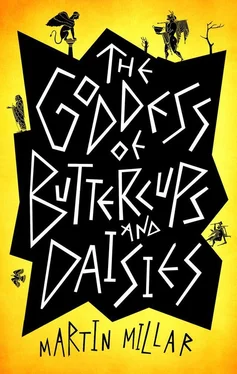‘Is Theodota on her own?’
‘No. The mistress is being painted by Zeuxis.’
‘Oh.’
Aristophanes hadn’t known that Zeuxis was painting Theodota. It wasn’t really a surprise. He was one of the most famous painters in Greece. He came from the Greek colony in Heraclea, and had studied under Apollodorus.
‘I’ll ask her if you can observe, if you wish.’
He followed the servant through several long corridors towards one of the numerous reception rooms. Inside, Theodota was reclining naked on a couch. The afternoon light streamed in through the open window, illuminating her. Zeuxis stood at an easel, brush in hand. He was quite an unconventional character. Mid-forties, but with longer hair than you’d expect, and a very unusual silver necklace. Artists could get away with that sort of thing, if they were famous.
Aristophanes wasn’t pleased to find Socrates reclining on another couch, observing. He greeted the philosopher stiffly, Zeuxis a little less stiffly, and smiled at Theodota. Theodota smiled back at him. She wasn’t at all self-conscious about being naked in company.
‘Aristophanes, we were just finishing for the day.’
Zeuxis put down his brush. ‘Ah, Theodota. I never thought I’d find a model beautiful enough for my painting of Helen of Troy.’
Aristophanes didn’t like the way they were smiling at each other. He wondered if Zeuxis had become her lover. He felt a pang of jealousy, adding to his annoyance about Socrates being here. The man got everywhere.
Theodota motioned for a servant to bring her a robe.
‘If you wait in the next room I’ll join you soon,’ she said.
Aristophanes waited with Socrates in another of Theodota’s elegant reception rooms, of which there were many. On a shelf by the window were two vases, painted by Euphronios. In the fifty or so years since his death, Euphronios’s work had become so famous in Athens that his plates, vases and amphoras were now priceless collector’s items. Families who were lucky enough to own them, old Athenian families with roots deep in the past, wouldn’t let them out of their sight. Even a man as rich as Callias wouldn’t be able to get hold of many of them. Yet here were two of them, just sitting on a shelf in Theodota’s reception rooms.
Aristophanes studied the vases for a few minutes. One depicted a courtesan, another a satyr. They were beautiful pieces of work. Euphronios deserved his reputation. Socrates was staring into space. As ever, he was dressed in the plainest homespun chiton, and a pair of leather sandals that had seen better days. Aristophanes asked him what he was doing there.
‘Theodota invited me to observe the famous Zeuxis at work.’
‘Oh. She never invited me. It’s strange the way Theodota likes you so much. And annoying.’
‘Why is it annoying?’ asked Socrates.
‘Because I’ve paid out a lot of money to her and you never pay her anything!’
‘We have different expectations. I admire Theodota for her intelligence.’
‘Trust you to be the only person in Athens who admires her for that.’
Socrates smiled genially. ‘Zeuxis is a fine painter. I’d say his technique rivals even that of Parrhasius.’
‘Parrhasius? Has he been here as well?’
Parrhasius was another very famous artist. Aristophanes knew he shouldn’t have been annoyed by the way Greece’s most brilliant artists flocked to Athens to paint Theodota, but he was. He suspected that his own fame as a playwright was the only reason she acknowledged him at all, and he wasn’t as famous as Zeuxis or Parrhasius. He could see himself being forced out of the picture if they stayed around.
‘Are they in love with her?’ he asked, which was a highly inappropriate question, and one at which Socrates would have been quite entitled to laugh. He didn’t.
‘I couldn’t say. They might be. Or they might just be here because she’s one of the few people in Athens with enough money to pay their fees these days.’
A servant appeared, beckoning them through to a dining room which faced south, and was always light and airy. Theodota, now dressed, was sitting at a table laden with bowls of fruit and bread. An amphora of wine was resting on a smaller table. Aristophanes greeted her as naturally as he could, but in truth he was apprehensive. He’d come on a delicate matter, and finding Zeuxis and Socrates here had put him off his stride. At least Zeuxis seemed to have departed. He wondered if either Zeuxis or Parrhasius had managed to catch the blue of Theodota’s eyes properly. No one had eyes as blue as Theodota.
Perhaps it wasn’t so bad that Socrates was here. He could be tactful, when required. If it all went humiliatingly wrong with Theodota, he’d probably manage to say something to make things less awkward. He had on one occasion rescued Aristophanes from an embarrassing moment concerning Nicias’s wife, when the playwright had put his foot in it with a comment about the poor quality of the wine on offer. He hadn’t known her father owned the vineyard.
‘So, Aristophanes.’ Theodota smiled. ‘I wasn’t expecting you today.’
Aristophanes wondered if either painter had managed to capture her smile. He doubted it. Theodota’s smile could not be reproduced.
‘Theodota, I wanted to ask you something, but… eh… the thing is… hmm… it’s a little embarrassing…’
Theodota looked amused. ‘Feel free to speak your mind, Aristophanes. I started in my profession at a young age, and it would be very difficult to shock me.’
‘I need to borrow a lot of money.’
Greatly shocked, Theodota had a coughing fit as some wine went down the wrong way, and she had to be assisted by her servants. There was quite a long delay while she was patted on the back and brought back to life. A young servant was sent off to fetch soothing oils.
Aristophanes shrank in his seat . That went worse than I expected. I’ve almost killed her.
Finally Theodota regained the power of speech. ‘You want to borrow money? Aren’t you wealthy?’
‘I was, before the war. These days I’m poor like everyone else. My choregos Antimachus is starving me of funds. He doesn’t like that I’m writing about peace. He doesn’t want a comedy about the war ending to be successful.’
Aristophanes looked hopefully at Theodota. ‘But you, as an intelligent woman, will be eager to see an end to the fighting.’
‘Why? It’s good for my business. When the rich men of Athens realise that they’re liable to get killed any day, they tend to turn to me for comfort.’
‘That may be the case. But it’s not good for the people who get killed, and the people who have their farms and businesses ruined.’
‘True,’ said Theodota. ‘But as no one permits me, or any other woman in Athens, to have a say in politics, you can’t blame me for making the best of the situation.’
She mused for a moment, then turned to Socrates. ‘What do you think? Would backing Aristophanes’ play really help end the war?’
‘It’s possible,’ said Socrates. ‘It might influence the population. The situation is finely balanced.’
Theodota nodded. She motioned to one of her young attendants, the attractive young Mnesarete, and whispered in her ear. Mnesarete departed. Theodota sipped a little wine, rather carefully after her recent distressing experience.
‘Aristophanes, you remember I told you I’d been writing in my spare time?’
Mnesarete returned. She was carrying a scroll, which she handed to Theodota.
‘My first draft of a comedy,’ said Theodota. ‘I call it Lysistrata . You might like it. It’s rather anti-war, just like your work. Though in my play the women of Athens have a lot more say in things.’
Aristophanes was puzzled by this development, and wary. ‘I’d be… pleased to read it some time.’
Читать дальше












